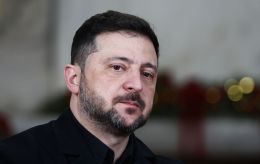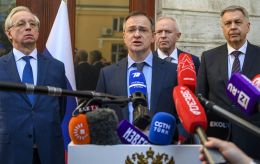Erdogan steps in: Will Türkiye host Zelenskyy, Putin, and Trump meeting
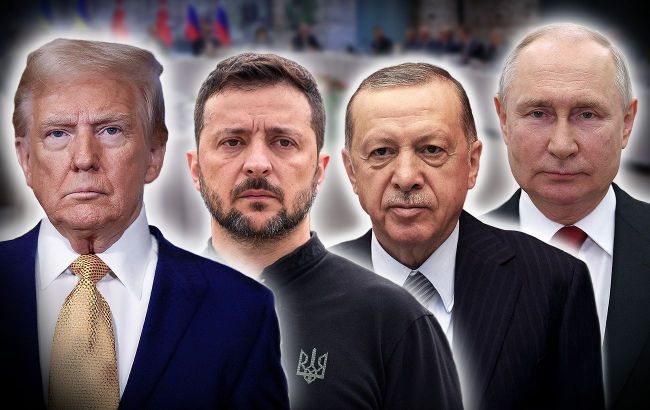 Donald Trump, Volodymyr Zelenskyy, Recep Tayyip Erdoğan, Vladimir Putin (collage: RBC-Ukraine)
Donald Trump, Volodymyr Zelenskyy, Recep Tayyip Erdoğan, Vladimir Putin (collage: RBC-Ukraine)
Why is Türkiye announcing a meeting between Volodymyr Zelenskyy and Vladimir Putin? Will Donald Trump also attend such a summit? And what are the chances that it will take place at all? These questions are analyzed in an article by RBC-Ukraine.
Key questions
- Why has Türkiye begun promoting the idea of a meeting between Zelenskyy and Putin on its territory?
- How are the plans to bring the leaders together related to Trump's ultimatum?
- Why is Türkiye the best negotiating platform for Putin?
- What could compel Putin to come to the negotiations?
"We believe this war must end. Just as the negotiation table was set in Istanbul, the peace table will once again be set in Türkiye — and this bloody war will be brought to an end," Turkish President Recep Tayyip Erdoğan said on Monday, July 28.
The Turkish leader's recent statements and actions indicate a serious intention to take negotiations on the Russian-Ukrainian war to a new level. To this end, he plans to arrange a meeting between the leaders of the warring states, Volodymyr Zelenskyy and Vladimir Putin, with his mediation. US President Donald Trump may also participate in the negotiations, but neither the format nor the meetings themselves have been confirmed by anyone yet.
According to Turkish Foreign Minister Hakan Fidan, his country has received agreement from all parties to hold the summit, but the date depends on the results of the work of the Russian and Ukrainian negotiating teams.
According to CNN Turk, Türkiye intends to leverage Erdoğan's connections with all the leaders. To this end, the Turkish President has held telephone conversations with both Trump and Putin.
Window of opportunity
There are indeed certain prospects for such a meeting, but numerous factors could still influence the development of the situation.
"Türkiye is constantly on standby and steps in when it sees an opportunity for dialogue. Today, against the backdrop of changes in the geopolitical situation and the active role of the United States, the Turkish leadership feels that a window of opportunity has opened," says Yevhenia Haber, senior analyst at the Center for Contemporary Turkish Studies, in a comment to RBC-Ukraine.
In mid-July, US President Donald Trump seemed to have finally realized that Putin had been leading him by the nose for a long time. At a meeting with NATO Secretary General Mark Rutte, the American leader said he was very dissatisfied with Putin and gave Putin 50 days to agree to a ceasefire. However, on July 28, Trump revised the terms of his ultimatum, reducing it to 10-12 days. And on July 29, he clarified that the 10-day countdown begins on that date.
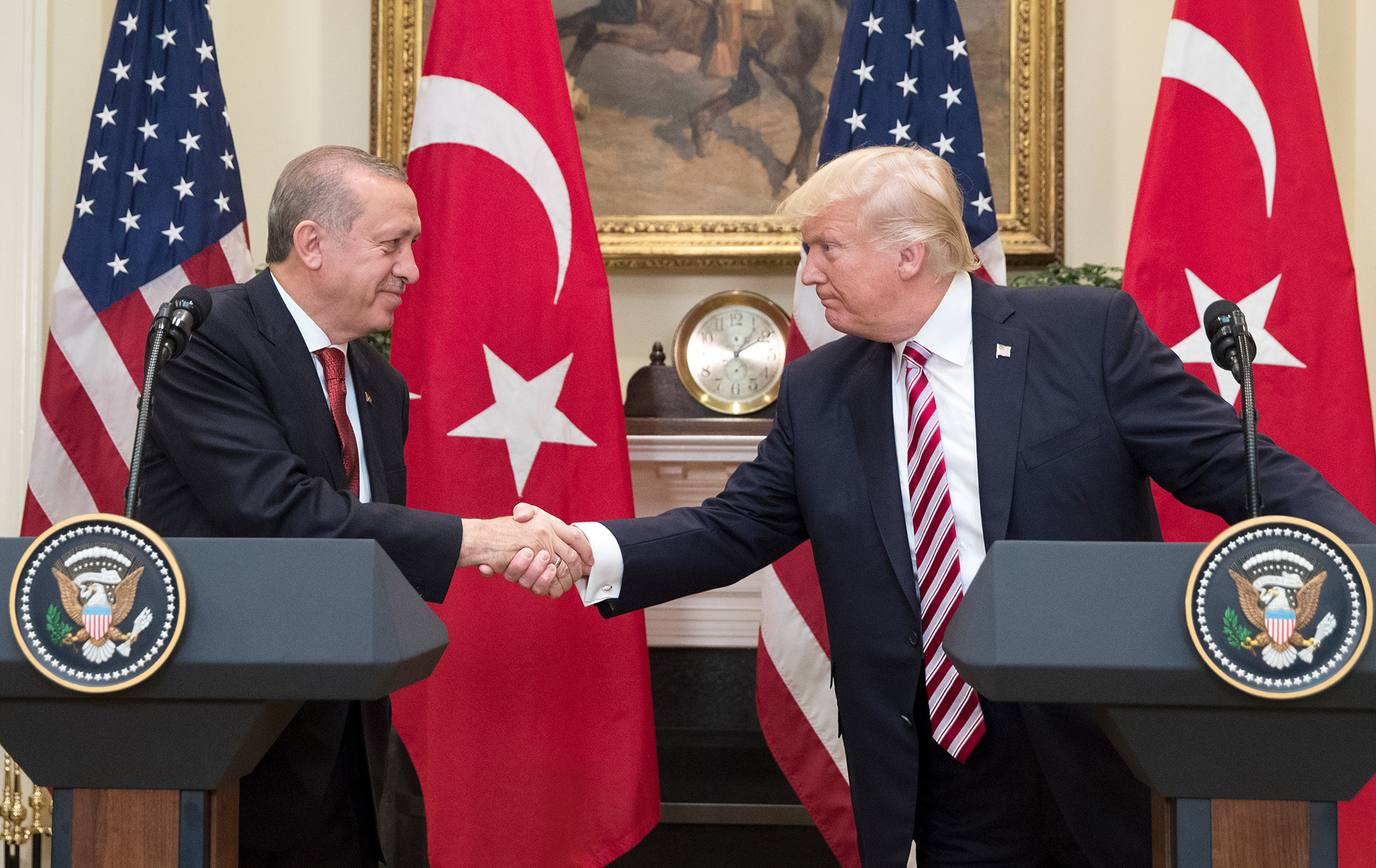 Recep Tayyip Erdoğan and Donald Trump (photo: Getty Images)
Recep Tayyip Erdoğan and Donald Trump (photo: Getty Images)
Erdoğan's intensified efforts and Trump's new ultimatum did not coincide by chance. In practice, this means cooperation between the US and Türkiye — and, in the future, Europe — to bring Putin to the negotiating table.
"Türkiye suits Trump. He has a good relationship with Erdoğan, and now it has only improved... Erdogan himself does not attack Trump. He has no conflicts with him and is fully in favor of reaching an agreement," political scientist and international expert Maksym Nesvitailov told the RBC-Ukraine YouTube channel.
Will there be a meeting with Putin?
Ukraine's position is clear: President Zelenskyy has long advocated a face-to-face meeting with Putin and would also like to involve European representatives in such a summit, which cannot be said about Putin.
The Kremlin has been rather vague in its comments on Trump's statements about 10-12 days and his telephone conversations with Erdoğan. On July 29, Putin's press secretary, Dmitry Peskov, said that Moscow had taken note of Trump's position but was not changing its course of waging war against Ukraine. According to him, the so-called special military operation continues. At the same time, Peskov said that Russia allegedly remains committed to the peace process.
As RBC-Ukraine previously reported, Russia is determined to continue military operations at least until the fall. According to the Russian leadership, there are still military and economic reserves for this. This is the main, but not the only, problem that arises in the negotiations.
"The Russians see the logic of preparing for the leaders' summit differently," Ukraine's Ambassador to Türkiye, Nariman Dzhelyal, told RBC-Ukraine.
According to him, President Zelenskyy proposed a meeting of leaders at which a certain framework would be outlined, and the negotiating teams would continue to work within this framework.
"The Russians say the opposite: first, our expert groups need to work, agree on something, and so on. And if there is any prospect of such an agreement, then, in their opinion, it will be possible to talk about a truce in general and a possible meeting between the presidents. We propose to stop the killings for the duration of the talks, but they want to continue killing until the positions are agreed upon before the meeting of the presidents," Dzhelyal emphasizes.
Trump's long-announced pressure on Russia, combined with a stable supply of weapons to Ukraine, could change Russia's position. Both of these points depend on the position of the US.
Progress has already been made on arms supplies, albeit under new conditions. On July 24, the US State Department approved the sale of HAWK Phase III anti-aircraft missile systems and Bradley infantry fighting vehicles to Ukraine. The funds for the weapons are to come from European countries.
The method of pressure on Russia is obvious – secondary sanctions, as announced by Trump himself at a meeting with Rutte. "We're going to put on tariffs and the various things that you put on. It may or may not affect them, but it could," the US President said on July 29. However, he wants to retain maximum flexibility in their application, so the relevant bill, which has been pending in the Senate for a long time, has been put on hold.
"I don't expect such a meeting and concrete results soon, but I think that after some time—in the fall or by the end of the year—all current efforts may resume real peace talks. But for this to happen, we first need to stabilize the military situation in Ukraine and stop the enemy," political analyst Volodymyr Fesenko told the RBC-Ukraine YouTube channel.
In practice, only dialogue on humanitarian issues is continuing—the only practical result of Ukrainian-Russian meetings is the exchange of prisoners. But in the current circumstances, even that is significant.
"The humanitarian track is, first of all, an opportunity to free our people. Secondly, it serves to maintain interest in the Istanbul process while there is no tangible progress on the main issue – a ceasefire. You know, it's like preheating the oven a little so that you can put what needs to be baked in it at the right time. The Istanbul process in its current form allows us to keep the situation ready," Nariman Dzhelyal told RBC-Ukraine.
Incidentally, a meeting between Trump and Putin in China is also being considered recently, on the 80th anniversary of the end of World War II – on September 2, 1945, the Act of Surrender of Japan was signed.
However, a meeting between Trump, Putin, and Xi Jinping in Beijing is unlikely, because then Trump would be forced to negotiate one against two, according to Volodymyr Fesenko. In addition, he said, the atmosphere of the event itself would not be conducive to negotiations.
Therefore, Türkiye remains the best platform for Putin. Even if it is necessary to stage another imitation of negotiations, once again lecturing the Americans on history since the time of Rurik.
Advantages of Türkiye as a mediator
In addition to purely logistical convenience, there are other reasons why this country has become key in the negotiations, to some extent even supplanting the US.
Türkiye's approach to negotiations is very different from that of the United States, Yevhenia Haber notes in a comment to the agency. Ankara is always ready, if possible, to provide a platform for negotiations and act not so much as a mediator as a facilitator.
"This means that it does not offer its terms for peace between Russia and Ukraine, does not exert public pressure on either side, but constantly emphasizes that it is the warring parties themselves who must decide on what terms they are ready to negotiate," Haber says.
There is another point that is important for Putin personally. Putin cannot enter most countries in the civilized world due to an international arrest warrant on charges of illegally deporting children from Ukraine.
"Erdoğan is the only one who can guarantee Putin's safety during the proposed meeting of leaders. This is because many countries have to comply with the decisions of the International Criminal Court. Of course, Putin visited Mongolia (which is a member of the ICC, ed.), but that's a different story. Among the countries that could claim (the role of mediator - ed.), Türkiye, in my opinion, is the best fit," Ambassador Dzhelyal told RBC-Ukraine.
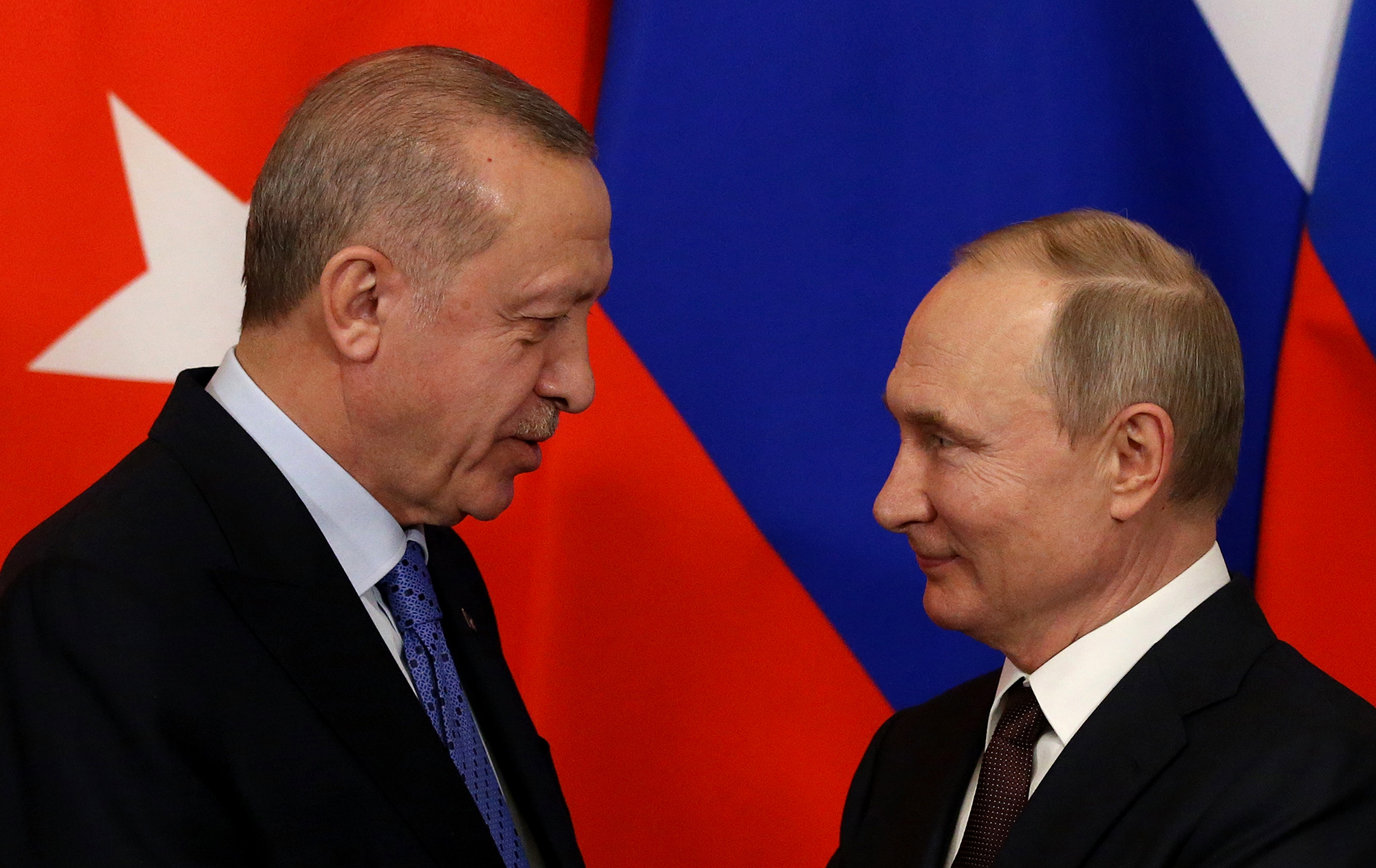 Recep Tayyip Erdoğan and Vladimir Putin (photo: Getty Images)
Recep Tayyip Erdoğan and Vladimir Putin (photo: Getty Images)
At the same time, all this means that Türkiye will only persuade Russia, as it is partially dependent on Russian fuel, although in recent years it has been trying to diversify its supplies, Yevhenia Haber told the agency. Almost half of Türkiye's domestic gas consumption comes from Russian imports. In addition, the Turkish Akkuyu nuclear power plant is being built with the participation of Rosatom, which creates strategic dependence in the field of nuclear energy.
"This is one of the reasons why Türkiye is refraining from putting pressure on Russia. In public, this approach will not change, but behind the scenes, theoretically, it will. But only if Russia continues to lose influence in regions where Türkiye traditionally has interests (Syria, the Caucasus, Central Asia, the Black Sea), or if the West increases sanctions pressure on Ankara, which is unlikely to happen," Yevhenia Haber emphasizes.
***
In the end, Trump's role and his willingness to actively pressure Russia remain key. The US President did not clearly state what the consequences for Russia would be after the deadline.
"At the end of 50 days, if we don’t have a deal, it’s going to be too bad. The tariffs are going to go on and other sanctions," Trump said about his previous deadline.
Of course, Trump's peculiar attitude toward deadlines has long been known — his favorite term of two weeks about Russia, and in the course of many other negotiations, has been postponed many times. But now there are signs that the American leader is determined.
All this does not mean that Trump will indeed come to the meeting with Erdoğan, Zelenskyy, and Putin, although this possibility remains.
Trump only needs a meeting after which he can immediately announce a resounding good result. On the other hand, he belongs to the category of politicians who are accustomed to resolving issues during personal meetings. In any case, we should expect new attempts to influence Trump personally.
As for Russia, it can fulfill the conditions of Trump's ultimatum—a ceasefire—without a personal meeting between the leaders. For example, last time, the ceasefire was announced in two statements – Russian-American and Ukrainian-American. But as practice shows, this does not mean that they will be implemented.
Sources: Statements by Turkish, American, Russian, and Ukrainian politicians, as well as comments by Nariman Dzhelyal, Yevhenia Haber, Volodymyr Fesenko, and Maksym Nesvitailov.
